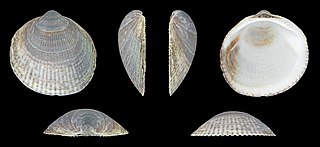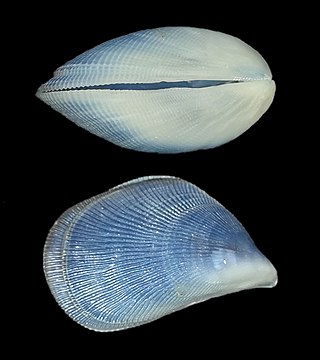
Bivalvia, in previous centuries referred to as the Lamellibranchiata and Pelecypoda, is a class of marine and freshwater molluscs that have laterally compressed bodies enclosed by a shell consisting of two hinged parts. As a group, bivalves have no head and they lack some usual molluscan organs, like the radula and the odontophore. The class includes the clams, oysters, cockles, mussels, scallops, and numerous other families that live in saltwater, as well as a number of families that live in freshwater. The majority are filter feeders. The gills have evolved into ctenidia, specialised organs for feeding and breathing. Most bivalves bury themselves in sediment, where they are relatively safe from predation. Others lie on the sea floor or attach themselves to rocks or other hard surfaces. Some bivalves, such as the scallops and file shells, can swim. Shipworms bore into wood, clay, or stone and live inside these substances.

A cockle is an edible marine bivalve mollusc. Although many small edible bivalves are loosely called cockles, true cockles are species in the family Cardiidae.
The shells of large saltwater bittersweet clams in the genus Glycymeris have a special archaeological significance in the southwestern USA, because the shells were used in trade item production by the Hohokam tribe of Amerindians. In this context the shells are known to archeologists as "Glycymeris shells".

Atrina fragilis, the fan mussel, is a species of large saltwater clam, a marine bivalve mollusc in the family Pinnidae, the pen shells.

The dog cockle or European bittersweet is a species of marine clam, a coastal bivalve mollusc of European waters.

Mactra stultorum, previously sometimes known as Mactra corallina, is a species of edible saltwater clam, a marine bivalve mollusc in the family Mactridae, the trough shells.

Lithophaga lithophaga, also known as date shell or date mussel, is a species of Bivalvia belonging to the family Mytilidae.

Euspira catena, previously known as Natica catena, common name the large necklace shell, is a medium-sized species of predatory sea snail, a marine gastropod mollusc in the family Naticidae, the moon snails.

Stramonita haemastoma, common name the red-mouthed rock shell or the Florida dog winkle, is a species of predatory sea snail, a marine gastropod mollusc in the family Muricidae, the rock snails.

The Mediterranean mussel is a species of bivalve, a marine mollusc in the family Mytilidae. It is an invasive species in many parts of the world, and also an object of aquaculture.

Tritia gibbosula, common name the swollen nassa, is a species of sea snail, a marine gastropod mollusc in the family Nassariidae, the Nassa mud snails or dog whelks.

Shell jewelry is jewelry that is primarily made from seashells, the shells of marine mollusks. Shell jewelry is a type of shellcraft. One very common form of shell jewelry is necklaces that are composed of large numbers of beads, where each individual bead is the whole shell of a small sea snail. Numerous other varieties of shell jewelry are made, including bracelets and earrings.

Glycymeris aspersa, common name the clothed bittersweet, is a species of saltwater clam, a marine bivalve mollusc in the family Glycymerididae, the bittersweets.

Glycymeris nummaria is a species of saltwater clam, a marine bivalve mollusc in the family Glycymerididae, the bittersweet clams.

Panopea glycimeris is a species of large marine bivalve mollusc in the family Hiatellidae.

Diplecogaster bimaculata, the two-spotted clingfish, is a species of fish in the family Gobiesocidae found in Black Sea, Mediterranean Sea and Atlantic Ocean where it is found on rocks and among seagrass or shell beds.
Polydora glycymerica is a species of annelid worm in the family Spionidae, native to the northwestern Pacific Ocean, where it lives commensally in association with a bivalve mollusc, usually Glycymeris yessoensis but occasionally with another species of clam. The worm intercepts food particles being drawn into the mollusc by its feeding current.

Glycymeris yessoensis is a species of bivalve mollusc in the family Glycymerididae. It can be found burrowing in soft sediment in shallow water in the Pacific Ocean around the coasts of China and Japan. It is often associated with a polychaete worm with which it forms a commensal relationship.

Septifer bilocularis is a marine bivalve species in the family Mytilidae, the mussels.

Glycymeris longior is a species of marine bivalve of the family Glycymerididae. The shells of this species are frequently found on beaches from Patagonia to Brazil. It was common in the Quaternary on the Atlantic coast of South America.


















